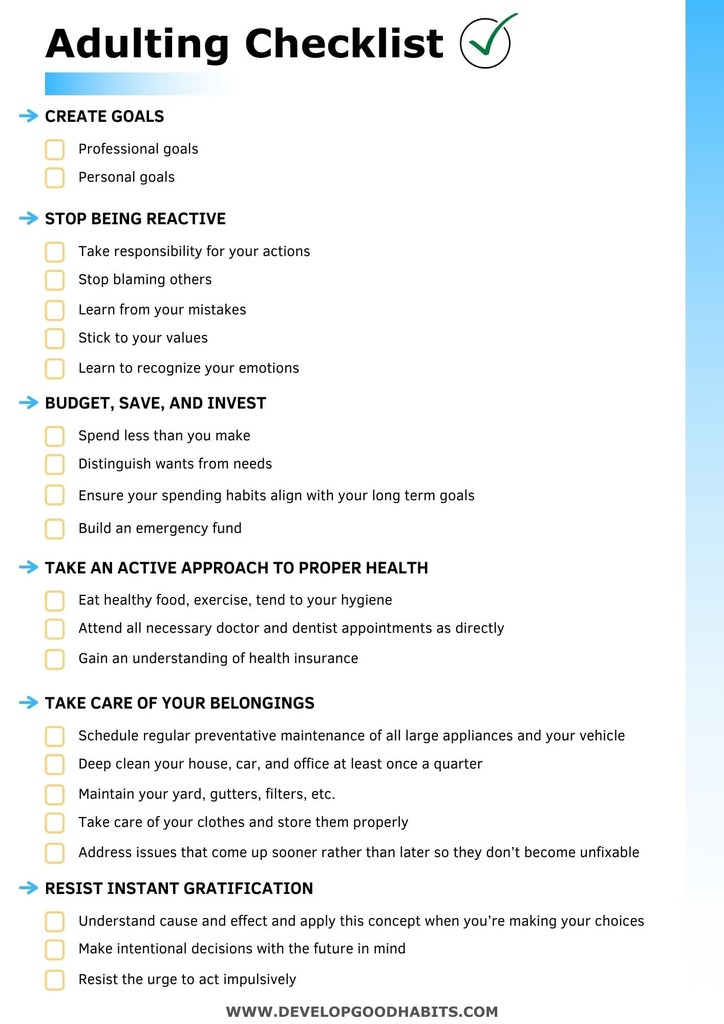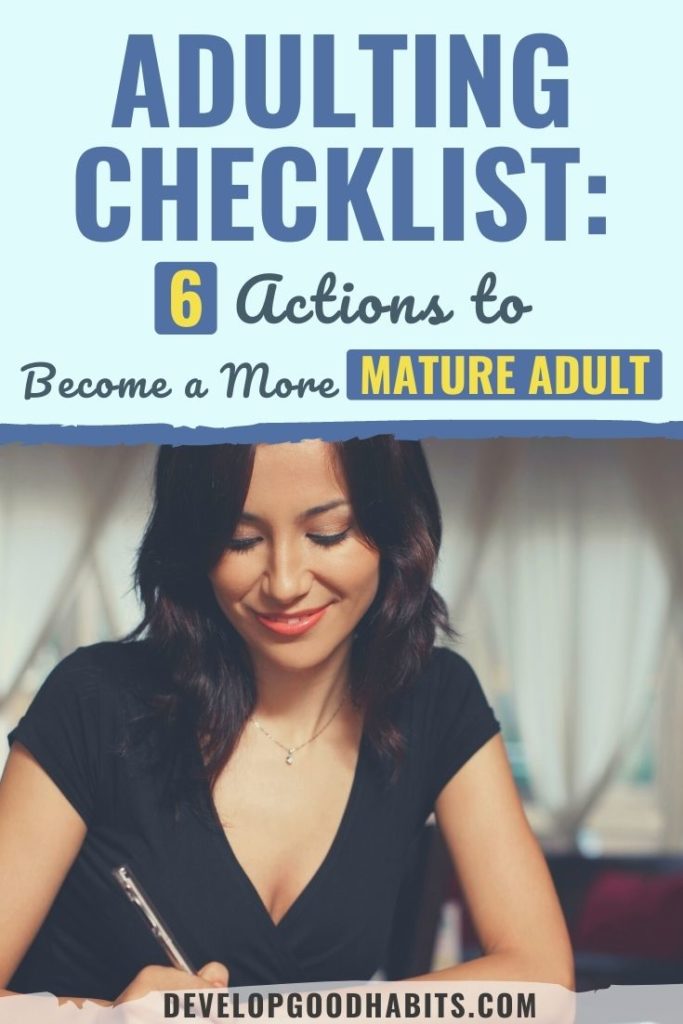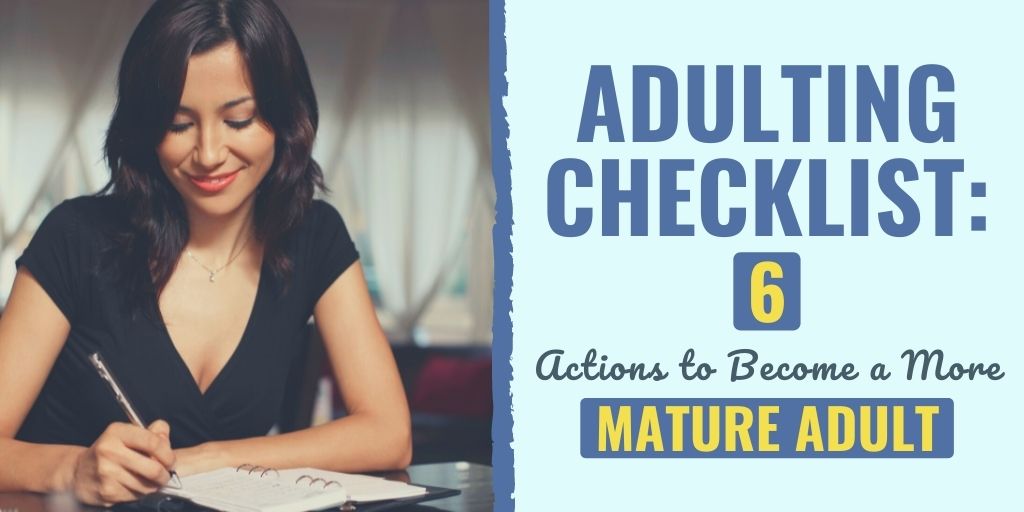There might be affiliate links on this page, which means we get a small commission of anything you buy. As an Amazon Associate we earn from qualifying purchases. Please do your own research before making any online purchase.
So, you’re ready to shake that imposter syndrome and become a more mature adult?
Studies suggest that, on average, people don’t start to feel like an adult until they’re 29 years old. And as someone who is in my mid-thirties and still calls mom and dad for help…a lot, I wonder if I was a late bloomer.
But maturity isn’t something that happens on its own with each birthday you have. And being an adult has a lot of variables in it aside from your current length of stay on Earth. I think we all know some children in their mid-40s and some adults who haven’t hit 20 yet.
You need to put effort into cultivating the emotional and psychological maturity you’re hoping to gain. Your level of maturity is dependent on how you’re living your life and the experiences you’ve been through that have shaped you into the person you’ve become–but it also depends on your mindset and attitude.
Becoming a more mature adult may be challenging, but you will recognize that you feel better about yourself with a little work in this area. And you can feel good about your starting place, because if you want to become mature, you have to be childish and immature first.
In this article, we are going to look at 6 actions you can take to become a more mature adult. So you can reference this information on your journey to becoming a mature adult, we've turned this list into a downloadable PDF that you can find here.
Let’s take a look.
Adulting Checklist: 6 Actions to Become a More Mature Adult
1. Create Goals
Some people say that the first step to adulting is to have a full-time job. I disagree. Often, people graduate college, start their career, and then have the self-awareness to recognize that this is not what they want.
On average, people have 12 jobs in their lifetime–so there is time between these jobs that you may go back to school or be working on personal development in some other way, which is certainly a mature decision to make. Additionally, 29% of people go on to have a completely different second career, which requires some transitional time where they were either in school or gaining some experience in a less-structured way than working full-time.
So, I would say as long as you have goals and are working toward something, you’re on your way to becoming a mature adult.
Resource: Of course you will have goals in more areas than just your professional life, but part of being a mature adult is being able to be self-sufficient, which unfortunately does require having the ability to make a living for yourself. Here are some examples of goals for your career that you can cater to your individual situation.
Note: Of course not everyone spends their life in the working world and this doesn’t necessarily make you less of an adult. However, if all else fails, you should have something to fall back on, which requires working on goals pertaining to continuous growth of some sort.
2. Stop Being Reactive
When you’re reactive, you allow external factors to dictate how you behave. You passively respond to life and you struggle to keep up with the world around you. But if you’re able to take ownership and responsibility for your actions and be confident in your decisions, you will prevent the world around you from choosing your path.
When you stop being reactive, you stop blaming others. You realize it’s not your partner’s fault you’re unhappy in life, it’s not your parents’ fault you’ve ended up where you are, and it’s not the world’s fault that you don’t seem to be making progress. You take full responsibility for your position in life and realize it’s all a result of your past decisions. You learn from your mistakes and recognize right from wrong.
Furthermore, when you’re proactive, you stick to your values and beliefs, even if they differ from those around you. You don’t let other people pressure you into doing and feeling things that don’t feel right and you make the effort to consider cause and effect or benefits and consequences before you take action. You are aware of and respect your moral compass.
Another way to avoid being reactive is to learn to recognize when you’re upset, nervous, or mad before your emotions overwhelm you. If you feel tension rising, take a moment to cope with your feelings before saying something you will regret later. Replace negative emotions with useful ones by practicing deep breathing and using all of your senses to calm yourself. Once you’re calm, you will be better equipped to make a decision or take action.
Resource: Here are six habits you can adopt to be more proactive in your life.
3. Budget, Save, and Invest
In the most simple terms, you need to manage your money to ensure you have more of it coming in than you have going out. Live within your means, have money set aside for an emergency, and understand your needs vs. wants.
There are a lot of systems out there that people use to budget their funds, and you have to find which one works for you. But no matter what budgeting technique you use, it should ensure that you have reserved enough money for your current and future responsibilities before spending money on things you can live without.
Build your financial priorities around your goals. If you’re saving to buy a house, you need to live and spend accordingly. If you’re trying to pay down a high-interest credit card that you racked up before starting your adulting journey, you need to accept that a portion of your paycheck is going to go toward something that won’t give you any immediate satisfaction.
Your emergency fund should be able to cover things such as unexpected car repairs, bills for several months in case you lose your job, and other expensive surprises in life. This is also the time to learn about investing so you can make your money work for you.
Know your financial goals and what you need to do to get there.
Resources: Depending on where your financial literacy is struggling, here are several resources that can help you:
> 70+ Books to Help You Manage Your Money
> Tips for Responsible Spending
> 23 Podcasts on Investing
> Examples of Financial Goals
4. Take an Active Approach to Proper Health
In addition to eating well, maintaining proper hygiene, and staying physically active, taking the time to have annual health checks and seeing a doctor whenever you have concerns in between is the best way to prevent avoidable health issues. Get established with a primary care physician, a dentist, a dermatologist, and any other specialists that apply to you. Make your appointments in advance to see each of these doctors at least once a year.
On top of this, you should gain a basic understanding of health insurance so you can be sure that no matter what your marital or employment status is, you’re covered in case something comes up. Furthermore, knowing the differences between various types of health insurance will allow you to pick the best plan to suit your needs in case an employer offers several medical insurance options as part of their benefits package.

With an understanding of how health insurance works, you will be able to plan in advance so you don’t become uninsured during big life changes, such as leaving your job to go back to school or handling an emergency if you lose your medical benefits through your employer.
Health insurance policies and laws frequently change, especially when new people are elected into office. But if you know the basics of insurance, you will be able to understand how you’re specifically impacted by these changes when they occur.
Resource: This site breaks down all of the different types of health insurance that are available.
5. Take Care of Your Belongings
In addition to taking care of your body, you need to accept the responsibility of taking proper care of your living environment, pets, clothes, car, etc. Now, while taking care of your belongings isn’t unique to adulthood, having a full comprehension of cause and effect and making the effort during your free time to prevent (even unlikely) things from happening is a very mature thing to do.
There are a number of things you need to do to maintain proper upkeep of your assets, such as:
While maintaining the wellbeing of your personal property might not be exactly how you want to spend your Sunday, consider this:
There are significant savings–in both time and money–associated with spending a minute or two every now and then fixing things that aren’t broken.
6. Resist Instant Gratification
Experiencing consequences is an essential part of developing into a functional citizen and adult. However, in our society of Uber Eats, free same-day delivery, and entire seasons of television shows at our fingertips allows us to remain in a perpetual mental state of childish desires.
Yes, YOLO, but you don’t want to waste that one life that you have. Let’s look at the difference between two lifestyles:
The first one is the one to which many have become accustomed: unhealthy food delivered to wherever you are in a matter of minutes, sleeping all day, instant entertainment in any form on the Internet (including endless shopping), endless television, you can even have alcohol delivered to your door in under two hours with an app.
There are no limits and nothing holding you back…aside from the potential of debt, poor health, wasted time, and addiction.
The second lifestyle is quite the opposite: eating proper portions of whole foods, using the Internet to benefit you and expand your knowledge, enjoying tv or movies in moderation, spending time in nature and engaging in physical activity, spending within your means, and being grateful for what you have. You’re still indulging in the treats every once in a while, but doing so with intention and restraint.
This second method leads to mental and physical health, focus, achievement, appreciation, and living a valuable life.
Those who live the first lifestyle are people who are stuck in the childish mind with which they were born. This describes people who never took the necessary steps to become a mature adult and understand cause and effect. But by living with a sense of mindfulness and making intentional choices–by favoring your long-term future over your short-term present–you can overcome these urges to act impulsively.
And, there will be times when you succumb to your urges, which is perfectly fine and normal. The key here is to notice how you feel afterward, and then determine whether or not you made a good decision. Then, next time you’re facing the same decision, remember the last time and move forward accordingly. With time, you will make better choices without having to think about it if you continue to pay attention to how they’ve turned out in the past.
Resource: In addition to practicing the technique above, check out this video to learn about overcoming the urge for instant gratification.
Final Thoughts on Becoming a Mature Adult
So there you have it! These are just a few of the actions you can take to become a more mature adult. One simple thing you can work on in order to act like an adult is to accept and feel good about yourself, even though you’re not perfect.
You can improve your maturity without abandoning your identity altogether. Continue to cherish your whimsical side and take life easy.
To wrap things up, here is a simple “adulting checklist” you can follow:

Finally, if you want to take your goal-setting efforts to the next level, check out this FREE printable worksheet and a step-by-step process that will help you set effective SMART goals.

Connie Mathers is a professional editor and freelance writer. She holds a Bachelor's Degree in Marketing and a Master’s Degree in Social Work. When she is not writing, Connie is either spending time with her daughter and two dogs, running, or working at her full-time job as a social worker in Richmond, VA.


